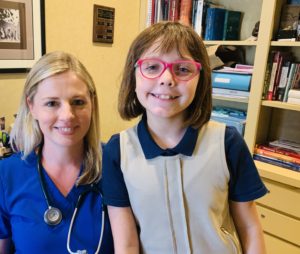
Photo by Gabriela Pataro
By Gabriela Pataro
Career Days in junior and high schools can give a glimpse of potential occupations and vocations to our youth. However, we as adults know the first time we have an interest in a particular field of work can be early in our childhood. Some of us grow up surrounded in the industry we will work in and others stumble into our work. My first interests were to be an airline pilot and then a teacher. While my myopia never permitted my first goal via entry into the Air Force, teaching was a large part of my career in the form of training employees; over and over and over I’ve seen that my hunch was a bit on point.
In the case of a young friend of mine, Lucy Buenrostro, a fourth grader of Hexter Elementary and resident of the White Rock area, she is fascinated by animals and is an aspiring veterinarian. Her running total of pets living and deceased is 14, a mix of dogs, cats and a hamster dispersed throughout her home and those of her grandmothers. On a trip home from Dallas Animal Services, where Lucy accompanied me to deliver donated items — newspapers, collars and towels — and pass out note pads and treats to staff, Lucy seriously contemplated the possibility of being a vet, being married and having children. She asked, “How can a person do all of that?” This led us to visiting our family’s long-time vet clinic, Dr. Katherine Mueller of East Dallas Veterinary Clinic, who graciously answered Lucy’s questions.
LUCY: What is it like to be a vet and be married and have a family?
DR. MUELLER: “Well, it’s really just like any other job. You learn to balance your schedules and luckily for me I have a day off during the week and I’m also off on Sunday because our clinic is closed. As to having a family I will soon find out because our first baby is on its way. It should be interesting.”
LUCY: How did you first know you wanted to become a vet?
DR. MUELLER: “When I was a child I wanted a puppy but my parents had six children and Mom told me I had to wait until my siblings were older. Finally, when I was 12 I got a puppy of my own. I grew up, went off to college, studied business and two years out of college I realized I didn’t like what I was doing and remembered I wanted to be a veterinarian. I attended Loyola University in Chicago for two years studying all the sciences I needed, I applied to Ohio State Veterinary School, and I got accepted. It was a long road.” Lucy stated she wants to attend Texas A&M.
LUCY: Do you ever use mechanical things in surgery like The Bionic Vet on TV, (Noel Fitzpatrick)?
DR. MUELLER: “Yes, all the time, I perform surgeries every week and we use a variety of mechanical tools for spay and neutering, tumor removals, spleen surgeries, dental cleaning, x-rays and such but we don’t perform the bionic surgeries here. When a pet needs that they are referred to a specialist.”
By this time, Lucy’s thinking cap is really on and she looks up from her list of questions. She asks, “My older dog Rocky has these lumps on the side of his ribcage, what do you think they are?”
Dr. Mueller asks her to describe the lumps texture and Lucy does. She replies, “They are probably benign little lumps called lipomas, it happens as dogs get older.” Lucy nods.
LUCY: Do you have animals at home and what are they? Do you ever bring them to work? “
DR. MUELLER: “Yes, Lincoln was a Golden Retriever and he got to come to work with me. But, unfortunately, he passed away a few months ago. I had him since he was a puppy.”
LUCY: How did you get through school without wanting to quit?
DR. MUELLER: “My first year of veterinary school was the toughest. There was lots of reading medical information and studying for hours and hours. It took four years.”
LUCY: Do you live far away?
DR. MUELLER: “No, luckily I’m only a 15-minute drive from home.”
LUCY: Is it true that all puppies are born with worms?
DR. MUELLER: “Not quite all, but worms in puppies is very, very common. They get them from their moms, and you can see their little puffy bellies. It’s easy to treat.”
After the Q & A, Lucy noticed the office reference books covering feline and canine nutrition, as well as one book titled the “Manual for Turtles.” Lucy laughs:
“Why would a turtle need a manual? “Turtles aren’t machines.”
